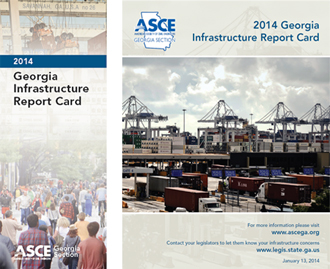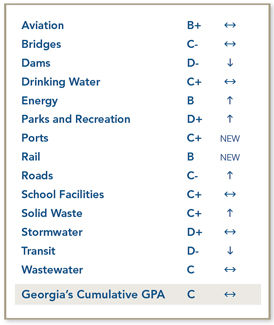 Georgia’s infrastructure has failed to improve over the last five years. In a new report, titled the 2014 Report Card for Georgia’s Infrastructure, the Georgia Section of the American Society of Civil Engineers (ASCE) awarded the state’s infrastructure a “C,” a grade unchanged from their 2009 Report Card. The lowest grade awarded was a “D-”, which went to the state’s dams and transit systems. The Report Card’s highest grade, a “B,” was given to Georgia’s energy and rail systems. Georgia’s growing population combined with cutbacks in infrastructure funding resulted in many of the low grades.
Georgia’s infrastructure has failed to improve over the last five years. In a new report, titled the 2014 Report Card for Georgia’s Infrastructure, the Georgia Section of the American Society of Civil Engineers (ASCE) awarded the state’s infrastructure a “C,” a grade unchanged from their 2009 Report Card. The lowest grade awarded was a “D-”, which went to the state’s dams and transit systems. The Report Card’s highest grade, a “B,” was given to Georgia’s energy and rail systems. Georgia’s growing population combined with cutbacks in infrastructure funding resulted in many of the low grades.
Specifically, the Report Card finds that Georgia is lagging in sustainable investment, including:
- Georgia ranks 49th in the nation in per capita transportation funding.
- Georgia is among the lowest in the country in transit spending per resident. According to the American Public Transportation Association’s 2010 Survey of State Funding for Public Transportation, Georgia spent just $0.63 per person in 2008. In comparison, New Jersey spent $119.52, Illinois spent $40.43, and North Carolina spent $7.94 per person in the same year.
- Georgia’s Safe Dams Program has faced over a 50% cut in staff since 2003, with each safety official now expected to oversee over 1,000 dams, or five times the national average.
- MARTA is the largest transit agency in the country to not receive state funding support for operations
- Georgia’s state motor fuel excise tax—which funds surface transportation projects—is one of the lowest in the United States
“From the Atlanta airport to the Port of Savannah, Georgia is a major player in the global economy” said Kat Gurd, President of the ASCE Georgia Section. “This Report Card shows that our connections to that economy are ailing, hurt too often by underfunding and increasing congestion. If we want to be the gateway to Southeastern commerce, we must deepen the Port of Savannah, increase our transportation funding, and modernize our infrastructure. ”
State civil engineers awarded the state’s infrastructure a cumulative grade of “C”, based on 14 categories. A team of volunteer civil engineers assessed hundreds of public records over the course of the past year to complete the Report Card. Category grades included: bridges (C-), roads (C-), dams (D-), aviation (C+), drinking water (C+), energy (B), parks and recreation (D+), rail (B), ports (C+), schools (C+), stormwater (D+), transit (D-), wastewater (C+), and solid waste (C+).
“One only needs to look at the Kia manufacturing plant in West Point to see how infrastructure can make a huge impact,” said Dan Agramonte, PE, Co-Chairman of the Infrastructure Report Card Committee. “Kia moved to Georgia to take advantage of the I-85 corridor. The new plant brought thousands of jobs to Georgia, and resulted in much, new business and auto suppliers moving to Georgia to leverage Kia’s new location. These businesses—and hundreds like them—are in Georgia because of our infrastructure, and now is the time to invest to make sure they stay and help us attract more like them.”
The Georgia Report Card was created as a public service to the citizens and politicians of the state to inform them on the infrastructure needs in their community. By using school report card letter grades, civil engineers have used their expertise to condense complicated data into easy to understand analysis.
State level report cards are modeled after the national 2013 Report Card for America’s Infrastructure, which gave America’s infrastructure a grade of D+.
To view the full version of the 2014 Report Card for Georgia’s Infrastructure please visit www.ascega.org.
Leave a Reply









I grew up in Miami, Florida but went to school in Georgia my last 6 years of education. It was so easy to see the vast difference between Georgia and Florida as far as the issues involved here. I have been living in Georgia after I retired from the Army in 1976 but also have a home in Florida and I have seen no difference in Georgia getting any better when compared to what I see in Florida. Georgia has very incomplete bus service where I live and if you do not have a car then you use the taxi. We have a black substance in our drinking water which you see in our bathroom sinks and toilet bowls after the water has set for a few hours. We have sidewalks in places where there are no curbs and a few pedestrians have been killed in the last couple of years because of this. I could go on and on but will stop here. I think your report is very accurate.